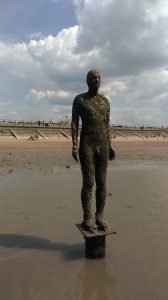
Antony Gormley’s statues have no pants at all. Is it time to take off my own metaphorical trousers?
Where I come from, pants means knickers. That’s not what I’m talking about here. I’m talking about outlining my novel.
In Lancashire, (and also in, you know, America) pants means trousers. Flying by the seat of them is a style of writing beloved of those who like to be spontaneous, creative, freeform. They are known as pantsers and are often set up in opposition to plotters, who prefer a more orderly approach. I don’t believe these styles are mutually exclusive, but it’s a handy label. I am a pantser, and I am also someone who wants to write a novel. That’s what this blog is about. I put on the pants in January 2016 and they are huge.
It’s now June. And for the first time in my life, the pants are not comfy.
I started with a story outline of my usual kind: a wobbly line drawn in a notebook, with a couple of high and low points labelled, like a cross section of the Lancashire Dales. Peaks were my main characters’ triumphs; valleys, their terrible defeats at the hands of the enemy.
Later I added a few pages of mind map, connecting the various scenes I had in my head (and also, now, in Scrivener*) and trying to invent the ones I would need to make it all work logically.
Two weeks ago with a large Don’t Know now blockading Part 1 and Part 3 of my story, I went out and found these books:
Take off your pants! by Libbie Hawker. This was my first admission that, for a story longer than anything I’d ever written**, I needed help.
Superstructure, by James Scott Bell. This had so many stars on Amazon that it was an obvious choice for someone with a novel to write and a pants problem.
Twenty Master Plots and How to Build Them, by Ronald B Tobias. This book has been on my shelf for twenty years I’d never read it. Time to open it up.
The Hollow Boy (Lockwood and Co), by Jonathan Stroud – well, I needed cheering up, and Stroud’s scary, funny, thrilling tales are a sure thing for that.***
Some detail on each of these books is in Part 2, but the bottom line is this: they didn’t help me outline a novel. Or rather, they didn’t help me with this novel. I will certainly be trying their methods for future stories, particularly some of the genre fiction I have lined up in my mental Must Write list.
My stories have never had any of these suggested structures. Reading these books left me panicking. Am I no good at all? Am I only made to enjoy the work of other writers, who can create a Mirror Moment (JSB) or show their character Girding Their Loins (LH)?
Every part of me answers No to these questions. I can write, I do write and I will write. I will work this out. I will stare at my wobbly cross section of the Dales until I figure out what is on that big peak in the middle, and how my lead will tumble down it, cursing, into the valley below.
So that’s where I’m up to. I’m sitting in enormous pants, with a complete idea for a book except some detail about the middle, unable to make my ideas fit other people’s. I’m not so arrogant as to think I have nothing to learn from established authors and screenwriters. Perhaps I am only hopeless at identifying a story’s structure (this does ring a faint bell from my English degree).
The only conclusion I’ve reached so far is that when I do figure out how story structure works for me, I’m going to write it down and put it in a book.
*I have a separate post on Scrivener, the writing software used by many authors and bloggers. I’m roadtesting it for my first proper novel, plus also trying out WordPress and having a personal blog for the first time. Because obviously writing a novel won’t occupy my entire life.
**Longest original story. I have fanfics which go on and on. They needed some outlining too, but I did it as I went along and it worked out fine. Probably because all the hard worldbuilding, characterisation, premise and motivation had been done for me.
*** The Hollow Boy was awesome. I devoured it in three sittings, ignoring my childcare and dinner preparation duties, and reading it on the train when a keen professional might have been doing a bit of unpaid overtime. I’m in love with Lockwood, and desperate to know the cause of the ghost Problem, and how the narrator, Lucy, will manage after the cataclysmic events at the end of this book. It’s part 3 of the Lockwood series and I already have part 4 on pre-order. Stroud is an amazing writer! I bet he understands story structure.
22/08/2016 at 16:50
Great information. Lucky me I ran across your blog by accident (stumbleupon).
I have saved it for later!